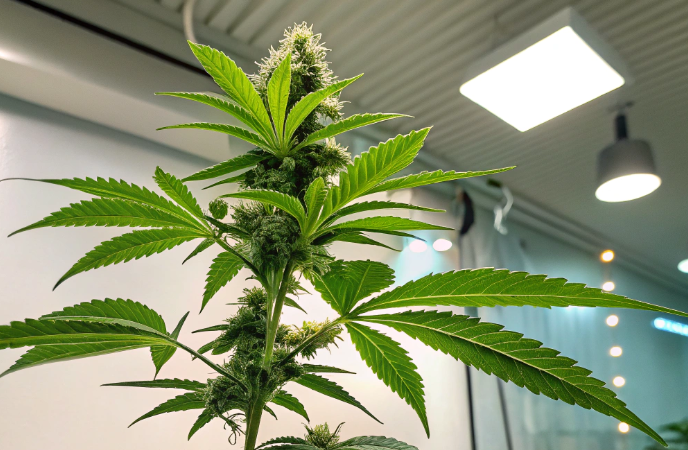How Does Cannabis Affect Your Brain?

© Recraft
Recent research has shed light on how cannabis use can negatively affect brain function, particularly in young adults at risk of psychosis.
A study conducted by McGill University researchers found that cannabis use may reduce brain connectivity by decreasing synaptic density, the connections between neurons that facilitate communication within the brain.
Understanding Cannabis: Origins and Historical Context
Cannabis, commonly known as marijuana, is a plant that humans have utilized for thousands of years for various purposes, including medicinal, recreational, and industrial applications. The origins of cannabis use trace back to Central Asia, with evidence suggesting its domestication around 12,000 years ago.
Early Uses and Cultural Significance
In ancient China, cannabis was cultivated for its fibers, which were used to make textiles, ropes, and paper. The Chinese pharmacopeia, dating back to 2800 BC, documents the use of cannabis for its alleged healing properties.
Similarly, archaeological findings indicate that cannabis seeds were present in Japan during the pre-Neolithic period, suggesting its use as a food source and possibly for its psychoactive effects.

The plant also held spiritual significance in various cultures. In India, cannabis has been associated with religious practices and is mentioned in ancient texts. Some Hindu sects consider it sacred, linking it to the god Shiva.
The Scythians, an ancient nomadic group, were known to use cannabis in their rituals, as documented by the Greek historian Herodotus.
Spread Across Continents
As civilizations evolved, the use of cannabis spread across continents. In the Middle East, it was utilized for its psychoactive properties and as an ingredient in traditional medicine. By the 16th century, cannabis had reached the Americas, introduced by European colonizers who cultivated it for its fiber, essential for producing ropes and textiles.
The Study: Assessing Synaptic Density
The study, published in JAMA Psychiatry, involved 49 participants aged 16 to 30, including individuals with recent psychotic symptoms and those considered at high risk. Using advanced brain scanning technology, researchers observed a significant decrease in synaptic density among participants at risk of psychosis compared to a healthy control group.
Implications of Reduced Synaptic Density
Synaptic density is crucial for efficient brain communication. A reduction in these connections can lead to symptoms such as social withdrawal and lack of motivation. These are challenging to treat. Dr. Romina Mizrahi, senior author of the study and professor in McGill’s Department of Psychiatry, noted that while not every cannabis user will develop psychosis, the risks are elevated for some.

She stated, “Cannabis appears to disrupt the brain’s natural process of refining and pruning synapses, which is essential for healthy brain development.“
Understanding the Risks: Cannabis and Psychosis
The link between cannabis use and an increased risk of psychosis has been a topic of concern. This study provides concrete evidence of structural changes in the brains of high-risk people. It shows the potential dangers associated with cannabis consumption.
First author Belen Blasco, a PhD student at McGill’s Integrated Program in Neuroscience, emphasized the importance of these findings for future treatments. Blasco explained that current medications primarily address hallucinations. However, they do not effectively tackle symptoms that impair social relationships, work, or school performance.
By focusing on synaptic density, there is potential to develop therapies that enhance social function and quality of life for those affected.
Broader Health Implications of Cannabis Use
Beyond its impact on brain connectivity and psychosis risk, cannabis use has been linked to other health concerns. A study led by Dr. Ibrahim Kamel from Boston University found that active cannabis users under 50 are six times more likely to experience a heart attack compared to non-users.
The research analyzed data from over 75 million individuals across the US, Canada, and India. It also indicated that cannabis users had double the risk of heart failure, quadruple the risk of ischemic stroke, and triple the risk of cardiovascular-related death.
Mechanisms Behind Cardiovascular Risks
The exact mechanisms by which cannabis influences cardiovascular health are still under investigation. However, researchers hypothesize that cannabis may affect heart rhythm regulation, increase the heart muscle’s oxygen demand, and cause endothelial dysfunction. These factors can collectively elevate the risk of serious cardiovascular events.
Cannabis Use Amid Medication Shortages
In some regions, shortages of essential medications have led individuals to seek alternatives, including cannabis. For instance, the NHS in the UK has faced shortages of ADHD medications. This has prompted some patients to turn to medical cannabis.

Some report improvements in their conditions. However, experts caution about the lack of evidence supporting cannabis’s safety and efficacy for treating ADHD. There are also concerns about potential addiction and other health risks associated with its use.
The Need for Caution and Further Research
As cannabis becomes more socially acceptable and legal in various regions, understanding its potential health risks is crucial. The findings from these studies show us the importance of exercising caution. This is especially true among young adults and individuals at risk of psychosis or cardiovascular issues.
However, further research is necessary to fully comprehend the long-term effects of cannabis use. Research is also necessary to develop strategies for mitigating associated health risks.

While cannabis may offer therapeutic benefits for certain conditions, its use is not without risks. Individuals should be informed of these potential dangers and consult healthcare professionals when considering cannabis as a treatment option.
Ongoing research and public health initiatives are essential to ensure that the benefits of cannabis use are balanced against its potential harms.
You might also want to read: Push-Ups to Reduce Heart Disease Risk: How Many Can You Do?


